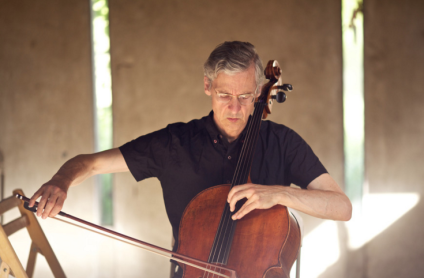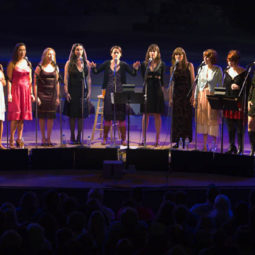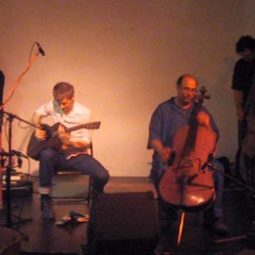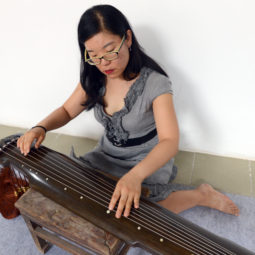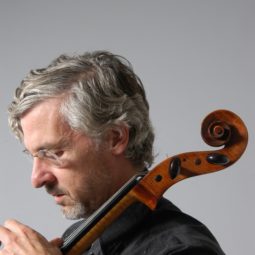
Charles Curtis
Cellist Charles Curtis has created a new body of work for solo cello through his collaborations with composers La Monte Young and Marian Zazeela, Alvin Lucier, Éliane Radigue, Christian Wolff and Tashi Wada, artists Alison Knowles and Mieko Shiomi, and filmmakers Raha Raissnia, Luke Fowler and Jeff Perkins. Rarely-heard works of Terry Jennings, Morton Feldman and Richard Maxfield have also been signposts in Curtis’s interpretive life. In the 1980’s Curtis participated in weirdo rock bands such as King Missile, Dogbowl and Bongwater and he performed with the noise formation Borbetomagus. Trained at Juilliard with Leonard Rose and Harvey Shapiro, Curtis received the Piatigorsky Prize of the New York Cello Society. For ten years Curtis was Principal Cellist of the Symphony Orchestra of the NDR in Hamburg; a former faculty member at Princeton and Brooklyn College, since 2000 Curtis has been professor of music at the University of California, San Diego.
As soloist in the traditional repertoire, Curtis has appeared with the San Francisco Symphony, National Symphony at Kennedy Center, the Baltimore Symphony, the Symphony Orchestra of the NDR Hamburg, the Orchestre de la Suisse Romande, the Orchestra of the Maggio Musicale Florence and the Symphonisches Orchester Berlin among many others, performing concertos with conductors such as André Previn, Herbert Blomstedt, Max Rudolf, Christoph Eschenbach and others. At the Ostrava New Music Days Curtis performed concertos of Feldman and Lucier with the Janacek Philharmonic under Petr Kotik. A devoted chamber musician, Curtis played for two summers at the Marlboro Festival and toured with Musicians from Marlboro, and he taught at the Steans Institute at Ravinia with Walter Levin of the La Salle Quartet. Curtis has been featured at numerous international festivals including the MaerzMusik Berlin, Sound and Music London, Festival d’Automne Paris, Inventionen Berlin and Angelica Festival Bologna.
Recently, Curtis has presented solo works of Alvin Lucier at the Auditorium du Louvre and premiered new works of Eliane Radigue at the College des Bernardins in Paris; presented La Monte Young and Marian Zazeela’s three-hour-plus solo cello work in the permanent La Monte Young-Marian Zazeela Dream House in Polling, Bavaria as well as in the Kampnagelfabrik Hamburg; premiered Tashi Wada’s new work for solo cello and modified tape deck at Issue Project Room, New York; given solo recitals in Boston, Philadelphia, New York, Paris, Providence and Colorado Springs featuring Christian Wolff’s new work “One Cellist”; hosted a retrospective concert of Christian Wolff’s music in San Diego; and performed solo concerts in the Rothko Chapel and the new James Turrell Skyspace in Houston. ArtForum has called Curtis “one of the great cellists” and the New York Times recently noted that his “performance unfailingly combined lucidity and poise… lyricism and intensity.” His occasional writing on music has appeared in the Dutch architecture journal Oase, Leonardo Music Journal, Attention Patterns and in “±1961: Founding the Expanded Arts” for the Reina Sofia Museum, Madrid.
Performing Compositions By:
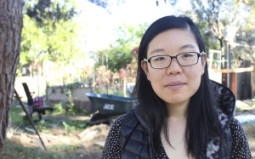
Carolyn Chen
Carolyn Chen
Carolyn Chen has made music for supermarket, demolition district, and the dark. Her work reconfigures the everyday to retune habits of our ears – using sound, text, light, image, and movement. Recent projects include a deconstructed scream, an ASL interpreter strung to chimes, an opera mashup of Euripides’ Hekabe and Red Riding Hood, and an assemblage on falling commissioned for the 2014 MATA Festival. Ongoing projects are for Wild Rumpus, Klangforum Wien, and the guqin. The New York Times described Wilder Shores of Love, commissioned for a 2011 Zankel Hall premiere by the Orchestra of the S.E.M. Ensemble, as “evening’s most consistently alluring piece … a quiet but lush meditation.” The work has been supported by the Fulbright Foundation, Paul and Daisy Soros Fellowships for New Americans, MATA, impuls Festival, Stanford University Sudler Prize for Excellence in the Creative Arts, University of California Institute for Research in the Arts, American Composers Forum, ASCAP, Emory Planetarium, Wellesley Composers Conference, and Machine Project at the Hammer Museum. It has been presented by PODIUM (Germany), MUSLAB (Mexico), Tempora (Bulgaria), Ostrava (Czech Republic), Apeldoorn (Netherlands), Harvard Summer Composition Institute, Sommerakademie Schloss Solitude, Tel Aviv Marathon, Film Festival Rotterdam, Zhuantang Demolition District Project, Dogstar, Darmstadt, and Poto. Chen has been fortunate to work with ensembles such as Surplus, Pamplemousse, Talea, Chamber Cartel, Die Ordnung Der Dinge, Dal Niente, On Structure, Ensemble This Ensemble That, Asamisamasa, NorthArc, Now Hear, orkest de ereprijs, Ostravska Banda, S.E.M., Prague Modern, Gliss, thingNY, Red Light, red fish blue fish, New York Miniaturist Ensemble, Silent Book, and Zwo. Recordings are available on Perishable, the wulf., and Quakebasket; scores are in Psychiana, China Academy of Art SIMA Journal, Closet Music Works, edited by Janet Oates, and A Small Book of Rounds, edited by Larry Polansky. Chen earned a Ph.D. in music from UC San Diego, and a M.A. in Modern Thought and Literature and B.A. in music from Stanford University, with an honors thesis on Free Improvisation and Radical Politics.
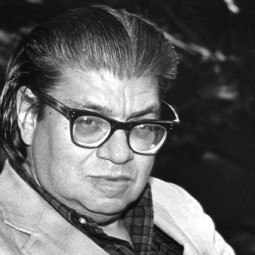
Composer Morton Feldman (LA Times)
Morton Feldman
Morton Feldman (January 12, 1926 – September 3, 1987) was an American composer, born in New York City. A major figure in 20th-century music, Feldman was a pioneer of indeterminate music, a development associated with the experimental New York School of composers also including John Cage, Christian Wolff, and Earle Brown. Feldman’s works are characterized by notational innovations that he developed to create his characteristic sound: rhythms that seem to be free and floating; pitch shadings that seem softly unfocused; a generally quiet and slowly evolving music; recurring asymmetric patterns. His later works, after 1977, also begin to explore extremes of duration.
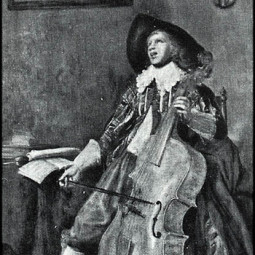
Tobias Hume
Tobias Hume
Tobias Hume (possibly 1579 – 16 April 1645) was an English composer, viol player and soldier. Little is known of his life. Some have suggested that he was born in 1579 because he was admitted to the London Charterhouse in 1629, a prerequisite to which was being at least 50 years old, though there is no certainty over this. He had made his living as a professional soldier, serving as an officer with the Swedish and Russian armies.His published music includes pieces for viols (including many solo works for the lyra viol) and songs. They were gathered in two collections, The First Part of Ayres (or Musicall Humors, 1605) and Captain Humes Poeticall Musicke (1607). He was a particular champion of the viol over the then-dominant lute, something which caused John Dowland to publish a rebuttal of Hume’s ideas. Hume was also known as a prankster, as some of his somewhat unusual compositions illustrate. His most notorious piece was “An Invention for Two to Play upone one Viole.” Two bows are required and the smaller of the two players is obliged to sit in the lap of the larger player. This work was notated in tablature and is indeed technically possible to play. His instructions to “drum this with the backe of your bow” in another piece, “Harke, harke,” from the First Part of Ayres, constitute the earliest known use of col legno in Western music.
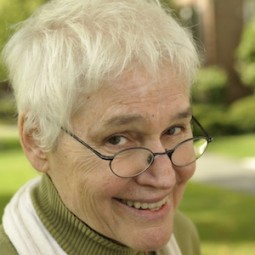
Alison Knowles (image Tony Rinaldo)
Alison Knowles
Alison Knowles is an American visual artist known for her soundworks, installation, performances and publications, and is a founding member of Fluxus. In 1967, Knowles produced what is considered to be the first computerized poem The House of Dust in collaboration with composer James Tenney. In the 1960s, Knowles composed the Notations book of experimental composition with John Cage, and Coeurs Volants, a print with Marcel Duchamp. Knowles’s Identical Lunch (1969) featured the artist performing her lunch routine, codified into a score, presenting a thoughtful meditation on the everyday. Informed by the sculptural qualities of books, Loose Pages (1983) replaces the spine of a book with that of a human, while pages fill the rest of the body. Her acclaimed exhibits and performances include two walk-in book installations The Big Book and The Book of Bean. In 2008, she performed three Event Scores at the Tate Modern in London, and in 2009 she exhibited and performed in The 3rd Mind American Artists Contemplate Asia, 1860-1989 at the Guggenheim Museum. She was appointed guest professor at Documenta X in Kassel, Germany, and in 2009 was an artist-in-residence at the Radcliffe Institute for Advanced Study at Harvard University. Knowles has exhibited her work at numerous institutions, including the Museum of Modern Art and the Tate Modern, and has received multiple awards and fellowships, including the Guggenheim Fellowship.
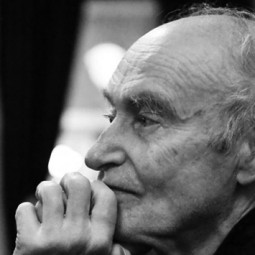
Chrstian Wolff
Christian Wolff
Christian Wolff is the last surviving member of the New York School of composers who revolutionized music in the 20th century. Along with John Cage, Morton Feldman, and Earle Brown, Wolff has changed the way musicians across the spectrum think about composition and performance, jazz, rock, and hip hop. Most profoundly, Wolff has impacted how classical musicians interpret their own craft. In the tradition of Charles Ives and Wallace Stevens, Wolff has sustained two careers through most of his life, composing and performing while having joint appointments in both the classics and music departments at Dartmouth College. After retiring from Dartmouth in 1999, Wolff has been more active than ever as a composer, fulfilling commissions, recording, and performing with his own ensembles and with the Merce Cunningham Dance Company. He has, to date, completed over 175 works for soloists, small and large chamber ensembles, orchestras, vocalists, and other musics created for unspecified instrumentation.
This performance is made possible in part by a City of West Hollywood City Arts Project Grant.
